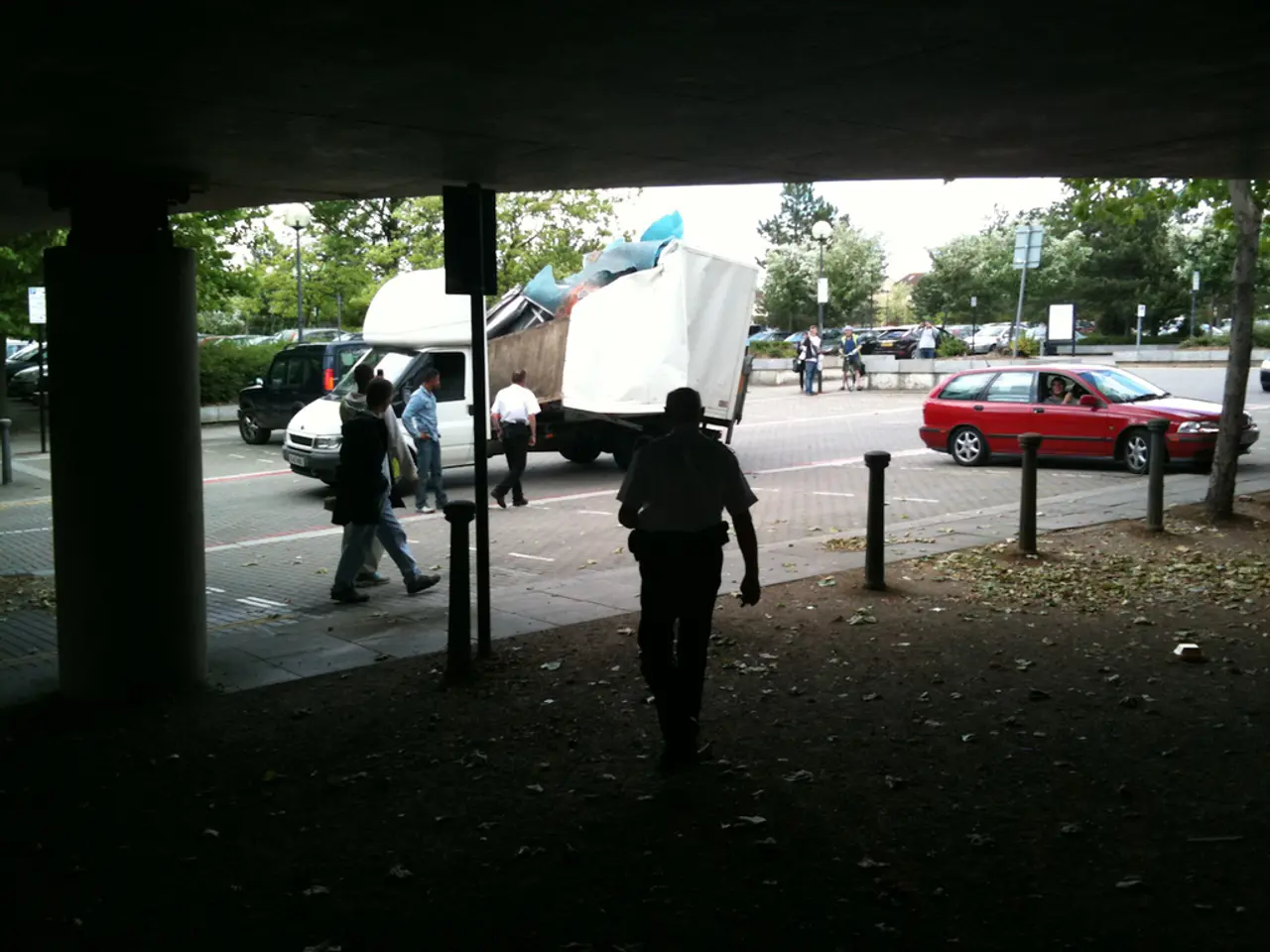Shift Towards Hydrogen-Fueled and Electric Vehicles in Logistics: Gradual Adoption Taking Place
In the rapidly evolving landscape of transportation, the shift towards zero-emission trucks is gaining momentum. Two key players in this transition are battery-electric trucks (BETs) and hydrogen fuel cell electric trucks (FCETs).
Battery-electric trucks, already in use, particularly in urban delivery fleets, run on large lithium-ion packs. They excel in short-haul, repeatable routes, urban parcel and grocery delivery, and return-to-base operations. Their high energy efficiency, lower fuel and maintenance costs, and suitability for predictable routes make them a popular choice [1][2][4].
On the other hand, hydrogen fuel cell electric trucks serve best in long-haul, time-sensitive operations requiring daily travel over 400+ miles without extended downtime. They offer a refueling time of 10-15 minutes, comparable to diesel, and are preferred when payload capacity is critical, as hydrogen tanks are lighter than large battery packs [2].
Logistics operators make practical decisions by evaluating factors such as route characteristics, infrastructure maturity, cost considerations, and regulatory and operational constraints. Predictable, shorter long-haul routes with charging options suit BETs, while longer and heavier payload routes favor FCETs [1][2].
The success of both technologies will be determined by their ability to deliver freight reliably, with route economics playing a significant role. Battery-electric trucks require reliable charging networks, often dependent on grid energy and longer charging times, while FCETs depend on emerging hydrogen refueling stations [1][2][5].
Cost considerations also come into play. Lower operational and maintenance costs for BETs make them attractive where range fits, while FCETs have higher initial and infrastructure costs but operational advantages for demanding routes [2][4].
As the transition from diesel to zero-emission trucks gains traction, logistics firms are deploying a mix of both technologies tailored to specific route and load requirements. This strategic deployment enables them to balance cost, efficiency, reliability, and infrastructure readiness [1][2][4].
Key distinctions between the two technologies include range per charge, refueling/recharging time, payload impact, infrastructure needs, and suitability. Battery-electric trucks have a range of approximately 400-500 km (250-310 miles), while hydrogen trucks offer a range of 500-600+ miles. Battery-electric trucks require extensive high-capacity charging stations, while hydrogen refueling stations are less widespread [2].
In the near term, growth in zero-emission trucking will focus on urban electrification, hydrogen corridor pilots, and incentive structures to encourage the adoption of these cleaner technologies [3]. Despite challenges, pilot programs suggest that hydrogen will play a role, especially as production scales and policies incentivize cleaner fuels.
References: [1] "The future of hydrogen fuel cell trucks." CleanTechnica, 2021. https://cleantechnica.com/2021/03/23/the-future-of-hydrogen-fuel-cell-trucks/ [2] "Battery-electric and hydrogen fuel cell trucks: A comparative analysis." Transportation Today, 2020. https://www.transportationtoday.org/battery-electric-and-hydrogen-fuel-cell-trucks-comparative-analysis/ [3] "The future of logistics: Zero-emission trucks." World Economic Forum, 2021. https://www.weforum.org/agenda/2021/05/the-future-of-logistics-zero-emission-trucks/ [4] "The rise of electric trucks in logistics." GreenBiz, 2020. https://www.greenbiz.com/article/rise-electric-trucks-logistics [5] "Hydrogen fuel cell trucks: The future of transportation?" Energy.gov, 2021. https://www.energy.gov/eere/fuelcells/articles/hydrogen-fuel-cell-trucks-future-transportation
- Analysis of the transportation industry shows a growing emphasis on renewable-energy and zero-emission technologies, such as battery-electric trucks (BETs) and hydrogen fuel cell electric trucks (FCETs), in the face of climate-change.
- Science and environmental-science communities highlight the importance of adopting these cleaner technologies to combat environmental degradation caused by traditional diesel trucks.
- As the global housing-market evolves, real-estate investments increasingly prioritize sustainable practices, including promotion of energy-efficient buildings and power sources like zero-emission trucks.
- The business and finance sectors are increasingly investing in the energy sector, particularly in renewable-energy companies that specialize in zero-emission truck manufacturing and infrastructure development.
- In the field of food-and-drink and lifestyle, consumers are becoming more conscious about their carbon footprint, and are opting for businesses that prioritize sustainable transportation methods, such as zero-emission trucks.
- The technology sector is also contributing to the growth of zero-emission trucks, with advancements in data-and-cloud-computing allowing for optimization of route efficiency and energy management.
- Sports and sports-betting industries are not exempt from this shift towards sustainability, with companies investing in electric or hydrogen-powered vehicles to reduce their carbon footprint, in line with growing consumer and regulatory expectations.
- Logistics firms are finding innovative ways to incorporate zero-emission trucks into their operations, using technology to analyze, route, and optimize their fleets for maximum efficiency and cost savings.
- The housing-market, food-and-drink, sports, and technology sectors are all interconnected, as they adapt to the changing climate and global-cuisines preferences, fueled by advancements in renewable-energy and zero-emission transportation.
- The growth of the zero-emission trucking industry will have rippling effects on various sectors, contributing to a more sustainable and environmentally conscious lifestyle, while spurring new economic opportunities and investments across industries.
- As the world continues to grapple with climate-change and the need for sustainability, the shift towards renewable-energy and zero-emission transportation, such as battery-electric and hydrogen fuel cell electric trucks, will be at the forefront of global industry developments.




